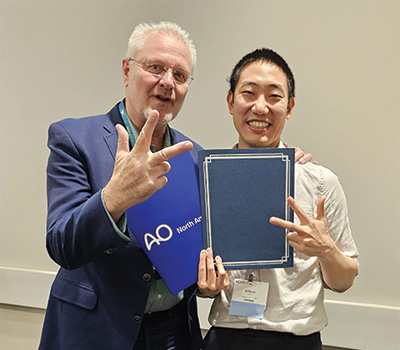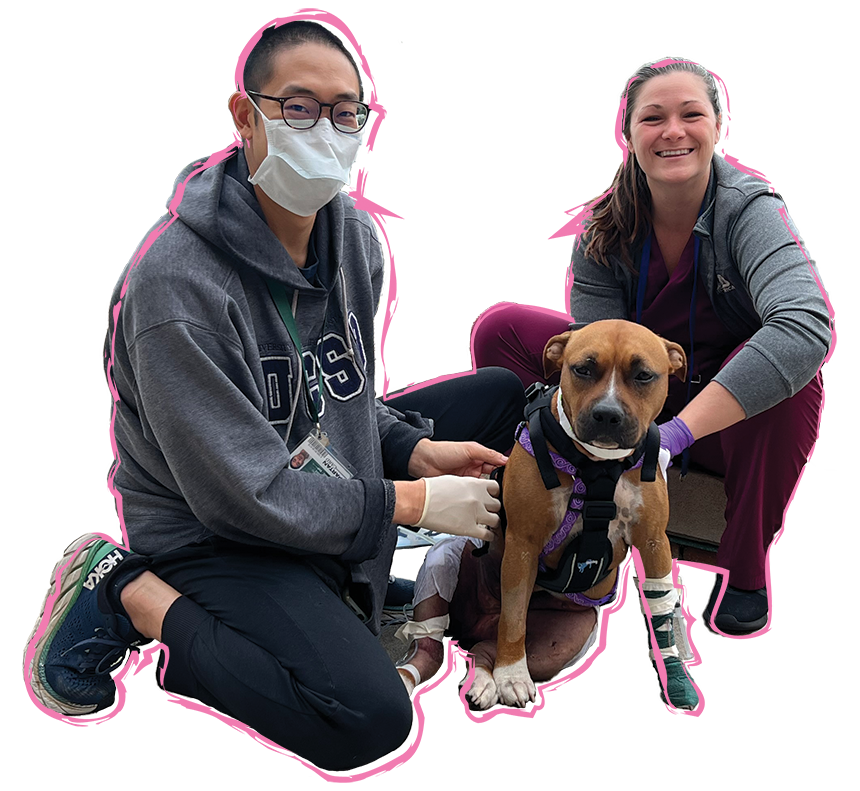

By Allison Hammerly and Emily Lenhard
Walking away from a conference with a research award is a high honor.
Walking away with an unprecedented three awards is almost hard to fathom.

. . . this is the first time that this perfect trifecta has been achieved in the history of the ACVS.
- Dr. Loïc DéjardinDr. William Chung, a surgical resident at the MSU Veterinary Medical Center, received three awards at the 2023 American College of Veterinary Surgery’s Surgery Summit in Louisville, Kentucky, in October. His work centers on bioengineering; particularly, investigations into orthopedic implants such as intramedullary nails for small animals.
Chung’s presentation, “Mechanical Comparison of Straight and Pre-bent Interlocking Nails Used for the Stabilization of Tibial Fracture,” was recognized with the following distinctions:
“It is an honor to receive recognition from the ACVS, the ECVS, and the AO Foundation,” says Chung. “I am very thankful to be given the opportunity to share the results of our study. More importantly, this gives us the opportunity to present our research findings to a broad audience and to further advance our collective knowledge in veterinary orthopedics.”


Chung, who earned his veterinary degree from the University of Pennsylvania School of Veterinary Medicine after earning a bachelor’s degree in mechanical engineering from the University of California, Santa Barbara, has been with MSU since embarking on a surgery internship in 2020. His study represents one of the many aspects of the comprehensive and ongoing I-Loc interlocking nail program, started in 2003 by Dr. Loïc Déjardin, W. O. Brinker Endowed Chair of Veterinary Surgery at the College and Chung’s mentor.
The I-Loc is an interlocking nail implant that resists fracture forces effectively with an interlocking mechanism between the nail and its securing bolts, which reduces the slack present in older nails. The interlock supports weight-bearing after surgery and makes the nail useful for many different kinds of fractures in dogs, cats, and even calves.
Chung’s work was funded by the College’s endowed research funds and veterinary orthopedic implants company BioMedtrix, which donated the nails used in the study.
Chung’s recent work goes hand-in-hand with that of one of his biggest mentors.
“I would also like to thank Dr. Loïc Déjardin for his unwavering support and mentorship over the past four years,” says Chung, “as well as the support from the MSU College of Veterinary Medicine’s endowed research funds.”
Déjardin notes the significance of Chung’s achievements: “These are the most prestigious awards offered at the ACVS—according to a past ACVS chair of the Board of Regents, this is the first time that this perfect trifecta has been achieved in the history of the ACVS. I am immensely proud of Will’s accomplishments, as they consolidate and further advance MSU’s position at the forefront of orthopedics.”
Déjardin has designed multiple surgical implants and instruments—including the I-Loc Interlocking Nail and the SILIS-MILAD surgical operative system—and is a highly regarded clinician and educator. And Déjardin is, in turn, a beneficiary of a long line of veterinary orthopedic excellence at MSU, having been mentored or collaborated with doctors who innovated the field.
Dr. Wade O. Brinker, for whom Déjardin’s position is named, is considered the father of veterinary surgery and retired from MSU in 1978 after teaching generations of surgeons and bringing new technologies and techniques into common usage. Dr. Gretchen Flo is another such influential figure. Co-author with Brinker on a manual that is relied on heavily today, Flo retired in 2022 after more than half a century of teaching and service, and having pioneered surgical techniques that are in widespread use today.
Two other veterinary orthopedics innovators who taught and practiced at MSU are Dr. Terry Braden and Dr. Steven Arnoczky. Braden patented a hip displacement surgical technique that regularly saves animals at MSU and elsewhere and investigated effective methods of teaching orthopedics. Arnoczky held the W. O. Brinker chair before he retired in 2017, and—for his work on ligament and meniscal injuries—became the second non-physician to be inducted to the American Orthopedic Society for Sports Medicine Hall of Fame.
Still early in his career, Chung is carrying the torch of Spartan orthopedic excellence, and his recent recognitions pave the way for his future steps. Not only will Chung present his research again at an AO VET meeting in April, but as part of the award from the ACVS/ECVS Speaker Exchange Program, he was invited to present at the 33rd ECVS Annual Scientific Meeting in Valencia, Spain.
The research was also selected for a Mark S. Bloomberg Memorial Resident Research Award
at the 51st Annual Conference of the Veterinary Orthopedic Society (VOS), and Chung’s team presented at the February VOS conference in Lake Tahoe, California.
